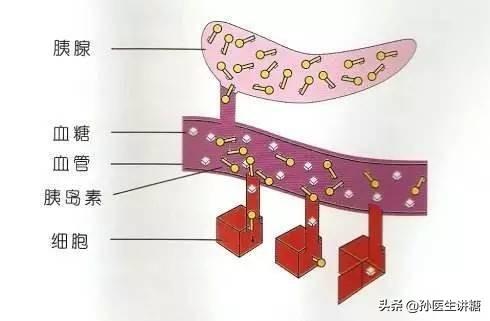How does the pancreas function on 36 units of insulin?
If you look at your insulin dose alone, it feels like you have poor insulin function, like type 1 diabetes, but diabetes is highly individualized, and you can't be sure of your insulin function based on a single value, such as an increase in the amount of food you eat or a poorly adjusted medication, which can end up with a very high insulin dose.To determine your islet function, you can get a C-peptide test to determine your islet function.
Diabetes specialists answer your questions, so pay attention to learn more.
Diabetic patients will inevitably encounter the use of insulin in the course of treatment, when to use, how much to use, is a common concern of doctors and patients.
Insulin is a hormone secreted by the B cells of the pancreas in our body that regulates sugar and lipid metabolism, and it is the only hormone in the body that lowers blood sugar.
What is insulin?
Insulin is the body's own secretion, can directly reduce blood sugar, it is like the "porter" or blood sugar into the cells of the key, blood glucose transfer to the body's cells to provide energy, without its help, the body can not complete the metabolism, life can not be sustained.

When the function of pancreatic islets declines, the amount of insulin secretion is insufficient or the amount secreted does not meet the needs of the body, it is necessary to additionally increase the supplementation of insulin, we use insulin agonists to stimulate the pancreatic islets to secrete more insulin, and the injected insulin is the additional supplementation of exogenous insulin.
Normal adult daily secretion is about 28u. Many people will think, the normal body's insulin secretion is about 28u, I apply 36u, I apply such a large amount of insulin, is my pancreatic function is very poor, the condition is very serious?
As a rule, the more exogenous insulin is supplemented, the less insulin is secreted by the body, or the more insulin is needed. The lower the amount of insulin produced by the body, the more pronounced the decline in pancreatic function.
However, there are many conditions that can lead to high insulin dosages.
Exogenous insulin acts in different ways
The efficacy of exogenous insulin is much lower than that of insulin normally secreted by the body. Because its mechanism of action, pathway and duration of action are different from those of endogenous insulin, the amount of insulin needed is higher.
Impact of insulin resistance
Many patients with type 2 diabetes and some patients with type 1 diabetes have some degree of insulin resistance, such as obese people, in the state of insulin resistance, it will make part of the insulin can not play a normal role, so the amount of need to be higher than the normal secretion.

high glucose toxicity
Diabetic patients with relatively high blood glucose have a certain degree of hyperglycemic toxicity, and the need for insulin is greater in this situation. We once had a patient admitted with diabetic ketoacidosis, and applied nearly 200u of insulin in 10 hours before the blood glucose gradually decreased, and then the symptoms improved, the insulin dosage was gradually reduced, and finally the insulin used at the time of discharge was only 18u, and the blood glucose was also relatively stable. Therefore, the amount of insulin used has great individual differences, and must be different from person to person, not uniform.
To summarize:Insulin application of 36u does not indicate how well the pancreas is functioning, it mainly depends on the state where you are at the time, obesity, type of diabetes, etc., and pancreas function can be determined by an islet function assay at your local hospital.
It's not good to just look at the amount of insulin, you should specifically look at islet function tests and do ogtt to see if it's an underproduction of insulin or an over resistance.
I suffer from diabetes for ten years, daily injections of insulin twice a day, a total of 42 units, ten years of medical officials and experience to share with the sugar friends, I hope to be able to help, in fact, is very simple, if you exhaust all sorts of methods such as insulin plus dimethylbiphenyl claw Glydonium urine, exercise, ten diet is still not ideal, you must be hospitalized, so that the doctor bang you to a normal range, and then discharged from the hospital according to the adjusted amount of medication every day, on time to eat! Diabetes is not terrible but also allows you to live a very regular life, although it can not be rehabilitated, but the impact on life expectancy is not very large.
Go to a metabolic disease hospital for such a specialized question! If you ask here, do you dare to take the advice of others?
This question and answer are from the site users, does not represent the position of the site, such as infringement, please contact the administrator to delete.